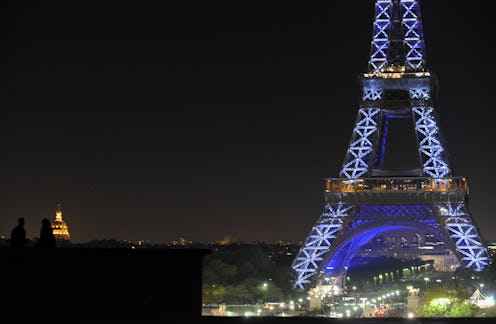Life
Why Monuments Around The World Went Dark On Saturday

On Saturday night, landmarks around the world went dark for an hour. If you were caught off guard by the sudden darkness in your city, you're probably wondering what Earth Hour means and what it has to do with you. The sight of an unlit Eiffel Tower might be a little unsettling if you don't know what's going on, but it's not a sign of the apocalypse — quite the opposite, in fact.
Created by the World Wildlife Foundation (WWF), Earth Hour has been around since 2007; this year marks the event's 10th anniversary. Each year, it draws attention to climate change (and saves a not-insignificant amount of energy) by asking cities and individuals to switch off their lights for an hour at a designated time. In 2017, it took place at 8:30 p.m. local time on Saturday, Mar. 25.
Although Earth Hour began as a single-city initiative in Australia, but it's grown to encompass millions of people across the globe. 2017 was its biggest yet, with an "unprecedented" 187 countries and territories joining in. According to the event's website, more than 3,100 landmarks and monuments — including London's Tower Bridge and Buckingham Palace, Dubai's Burj Khalifa, and New York's Empire State Building — and millions of individuals turned off their non-essential lights on Saturday night.
According to a press release, #EarthHour and related hashtags trended in 30 countries. There were participants on all seven continents, from Asia to Antarctica.
"Once again, the people have spoken through Earth Hour,” said Sid Das, Executive Director of Earth Hour Global in a press release. "Whether you are in the Philippines, Peru or Portugal, climate change matters and the record participation in this year’s Earth Hour is a powerful reminder that people, who are on the frontline of climate change, want to be a part of climate action."
Although the event may not save much energy in the grand scheme of things, Earth Hour's goal is to draw attention to climate change. Considering how startling it is to see the world's most famous monuments enveloped in darkness, their mission is definitely accomplished.
Thanks to human activities like burning fossil fuels and cutting down vast swathes of forest, climate change has begun to take a clear toll on the planet. According to the National Ocean Service, the sea level is rising at a steady pace as the Earth warms and polar ice caps melt, leading to increased flooding and shoreline erosion. There's evidence that the oceans are actually becoming more acidic as the result of increased temperatures and higher carbon dioxide levels in the atmosphere, which can destroy vulnerable coral reefs. This weekend, Newsweek reported that researchers believe it may be too late to save the Great Barrier Reef from dying off; at this point, 90 percent of the habitat is dead or bleached white.
Then there's the effect climate change has on wildlife. The plight of the polar bears is common knowledge, but according to the WWF, changing temperatures have affected snow leopards, Asian rhinos, orangutans, and more.
Climate change is depressing stuff, but as Earth Hour demonstrated on Saturday, millions of people understand that humans must change their ways if we have any hope of preserving our home. If you missed out on this year's Earth Hour and you're interested in participating, next year's event is scheduled to take place on March 24.